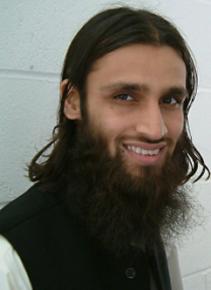Latest victim of the witch-hunt
reports on the federal government's success in forcing Syed Fahad Hashmi to agree to a plea deal that will keep him behind bars for years to come.
A YOUNG Pakistani man who spent nearly three years in solitary confinement has agreed to a guilty plea on one terrorism charge and a deal with federal prosecutors that will keep him in prison for a decade more.
On April 27, with his trial due to begin, Syed Fahad Hashmi pled guilty to a single count of providing material support to a foreign terrorist organization. Hashmi was forced to admit to a federal judge that he helped an acquaintance store and transport ponchos and waterproof socks for al-Qaeda organizations in Pakistan.
When he is sentenced in June, Fahad faces a maximum of 15 years in prison, though he has already spent nearly four years behind bars. Before the deal, he faced several other terrorism charges and the possibility that he would spend 70 years in prison.
His supporters expected the trial to proceed at the end of April, but Fahad was apparently troubled by a series of negative rulings in court, including the judge's decision to allow an anonymous jury in the case, as well as the prosecution's campaign to demonize him. As writers Wallace Shawn and Deborah Eisenberg, the state was using "tricks of the theatre...to make a human being look terrifying to an audience."

Faisal Hashmi, Fahad's brother, said in an interview with Democracy Now! that he "was completely surprised" by his brother's plea. As Faisal put it in a statement released by the Center For Constitutional Rights (CCR):
We welcome the fact that Fahad will leave prison with much of his life in front of him, however we are extremely troubled by the process that has brought us to this point. We are troubled not only for our family, but by the message a case like Fahad's sends to our community.
The process that troubles Faisal Hashmi and many others has included inhumane conditions during Fahad's pre-trial detention, the use of secret evidence and the denial of his habeas corpus rights. Jeanne Theoharis, a professor of Fahad's at Brooklyn College and co-founder of Educators for Civil Liberties, wrote at Slate.com that Fahad was going to trial "in a legal black hole right here in New York City."
FAHAD HASHMI grew up in Queens in New York City after he and his family emigrated there from Pakistan. In 2006, he was arrested in Britain and later became the first person to be extradited from Britain to the United States on terrorism charges.
The U.S. government claims that Fahad provided material support to al-Qaeda based on the statements of a cooperating witness who stayed with him in 2004 in London, where Fahad was studying for a post-graduate degree. The sum total of this "material support" is that Fahad knowingly let the visitor use his cell phone and stay at his student apartment with luggage containing ponchos and waterproof socks that were to be transported to al-Qaeda in Pakistan.
But as Faisal points out, his brother's detention is about much more than ponchos and socks.
Since 2007, Fahad has been held in the Special Housing Unit at the Metropolitan Correctional Center in Manhattan under Special Administrative Measures (SAMs). He has been in solitary confinement, without access to any natural air or sunlight and unable to communicate with other prisoners. He exercises alone for one hour a day in a small cage at the prison.
Other than his lawyers, his family has been allowed limited visits, the last of which was over five months ago. When visits have been permitted, family members have not been allowed any physical contact with Fahad.
Fahad has been detained under these severe conditions without being provided adequate information on why the SAMs were imposed and without being allowed an opportunity to argue and present evidence against the measures.
Before the trial, prosecutors called for an anonymous jury and extra security. CCR denounced this motion as "a clear attempt to influence the jury by creating a sense of fear for their safety and to paint Mr. Hashmi as already guilty." U.S. District Judge Loretta Preska ruled in favor of prosecutors motion a day before the trial was due to start.
What happens next in this case depends on the sentencing, due to take place on June 7. Theoharris, speaking at a vigil the week following his guilty plea, explained that Fahad could be moved after his sentencing to either a Communication Management Unit or Supermax prison. In both these possible scenarios, he would face ongoing limitations on his contact with other prisoners and his own family.
Theoharris and other supporters spoke to the need for activists to advocate for Fahad's rights in prison.


